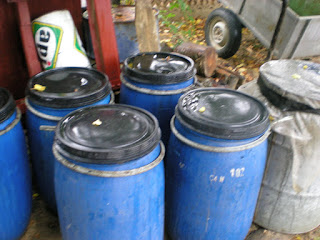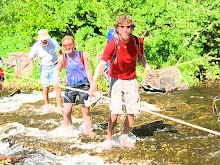Weekend In The Village
 A view of our village
A view of our villageOur first weekend in the village was a fun and relaxing one. It’s currently ајвар (pronounced I-var) season in Macedonia and virtually every family around is busy making the stuff. Ајвар is a sort of paste or spread that is served on bread or anything really. It’s made from peeled, roasted red peppers (ensuring maximum calories, minimum nutrition), an assortment of spices, and oil. Most families have their own special ingredients they add to the ајвар, such as roasted eggplant, tomatoes, chilies, or carrots. It tastes delicious with feta. We helped our host mother make ајвар and several other traditional Macedonian sauces usually canned for the winter months when fresh vegetables are scarce. We haven’t helped bake bread yet; I think we have to establish our competency with simpler tasks first. They have a brick hut oven in the backyard where Lela bakes all their bread from scratch. She also makes her own pasta…I’m not sure if she actually buys groceries.
 Jillian helps out with the special sauce
Jillian helps out with the special sauce Let the fermenting begin!
Let the fermenting begin!While Lela is busy making Martha Stewart look like Archie Bunker, Nicola is in the garage fermenting vats of his own wine. The whole process takes a few months, but starts with Nicola and Traiko picking grapes from their yard and putting them in large barrels that they occasionally check-up on and stir. The wine eventually has the color of a rose’ and the flavor of a crisp, light white wine--it is quite delicious. They also ferment their own ракиа (pronounced RAK-ee-a), another alcohol made from grapes. It smells like pure alcohol and tastes like fire. The men of Macedonia take pride in fermenting the strongest ракиа and drink small amounts with meals and on special occasions. We’ll stick to the wine.
Sunday was football day in the village. By football, of course, I mean soccer. It seemed like the entire population was out, crowded up on a hill overlooking the field where the village’s team was doing battle with the team from another town. It was a classic small-town social event: a few diehard fans (like Nicola) followed every play with much intensity, teenagers gaggled and were generally loud, and the old men waxed about this or that with occasional breaks to throw a dirty look at the kids.
Sunday was football day in the village. By football, of course, I mean soccer. It seemed like the entire population was out, crowded up on a hill overlooking the field where the village’s team was doing battle with the team from another town. It was a classic small-town social event: a few diehard fans (like Nicola) followed every play with much intensity, teenagers gaggled and were generally loud, and the old men waxed about this or that with occasional breaks to throw a dirty look at the kids.
 The village church
The village churchThe people of the village have been extremely friendly to all seven of us volunteers. This is the fourth straight year Peace Corps has been here, so most people are pretty used to having Americans around for a few months. Most curiosity comes from the very small children who perhaps don’t remember past volunteers.
We’ll sign off with the traditional Macedonian toast: Ноздравије!

One of the ubiquitous signs for Скопско, a local beer


4 comments:
Keep the updates coming. And naturally I'm interested in more details about the local beers.
Brad
Dan, It sounds like you and Jillian are adapting to your new life with gusto, and an appreciation for being the guest's of a great host family. I sure would like the name of your village so I could find it on Google Earth. Our blessings to you and your host family. Grandpa
Wow! Jillian and Dan I am so inspired by what you are doing. At this moment as I sit at my desk doing some fairly meaningless work I'm dreaming of packing it all in and heading out for an adventure!
Ноздравије!
-Mikii
Hi! I live in Macedonia too. I like your blog. Can you please tell me how you downloaded the cool map on your blog? And by the way, which state are ya'll from? We're from GA.
Jill :)
Post a Comment